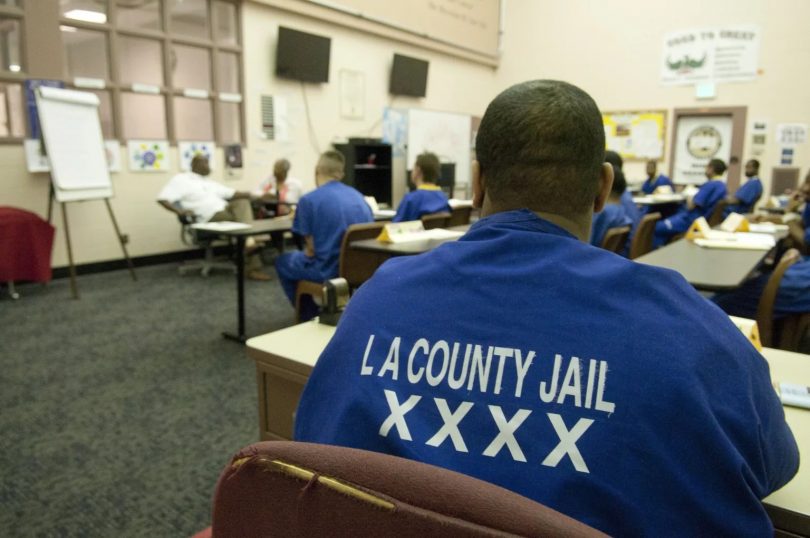by Angel Lopez, The Appeal
This piece was published in coordination with Zealous, an organization working to challenge injustice through media, storytelling, and the arts.
In April 2020, shortly after the COVID-19 pandemic hit, Los Angeles County Superior Court adopted the “emergency bail schedule” (EBS) policy, which protected people charged with most misdemeanors and low-level crimes from being jailed pretrial. The impact was significant. Instead of staying in jail because they couldn’t afford bail, thousands of people got to keep their jobs, continue going to school, take care of relatives, access needed medication, and experience everyday freedoms.
The EBS was a clear policy success. As was the case when New York and Houston enacted similar measures, rearrest rates remained the same and people continued to show up to their court dates. In fact, more people attended their court dates and taxpayers saved millions of dollars as a result. But the EBS’s future is currently precarious, at best: It was rescinded, then reinstated, by multiple Los Angeles County Superior Court judges and has not been permanently written into law.
It should be. I know the bail policy worked—because I was one of the many Angelenos who benefited from it.
I first became homeless as a teenager, but my feelings of precarity go back as far as I can remember. Along with my brother, I was adopted at age three into a two-parent home. Although imperfect, we were a family. But when my parents divorced, the impact of my father’s absence took a toll on me. Life as I knew it—family as I knew it—was over. My mother worked hard to take care of all of her children, but it wasn’t easy, and we found ourselves moving frequently.
The situation worsened when I was 19 years old. I had always experienced depression and anxiety, but that year I was formally diagnosed with bipolar disorder. Soon after my diagnosis, my mom kicked me out of her house, saying I treated it like a motel.
I wasn’t afraid of the streets. What worried me was where I would sleep and how I would interview for jobs without having a place to shower or the money to buy clothes. The lack of resources meant I began committing crimes of poverty, including petty theft, trespassing, and drug possession. I often had to steal food, hygiene products, and clothes. Police would ticket and sometimes arrest me for sleeping in public parks. Eventually, I started using meth in order to stay awake. That way, cops couldn’t rouse me and arrest me for trespassing. I was only trying to survive.
This was the cycle I was in when I was arrested during the pandemic. In normal circumstances, I likely would have spent months in jail only to be thrown back into the streets, having lost what few belongings I had and any progress I had made to get myself in a better place. Instead, the bail schedule freed me. This new normal allowed me to receive the drug treatment I needed and the additional resources and programs I would not have known about otherwise. I used every opportunity from EBS to get my life together, having learned this freedom could be hard to come by.
I had been in and out of my sons’ lives since they were born. But avoiding incarceration during the pandemic gave me the time and grace to be their dad, taking them to play basketball or skateboarding at the park. Like any parent, I’m happiest when I’m spending time with my children. They give me purpose. They give me hope. But the instability created by the old cycles of homelessness, drug use, and arrests hadn’t made it easy to see them.
The temporary bail rules of EBS allowed thousands of people like me, someone who has never had access to money or people who could post bail, to avoid needless incarceration.
Yet, the policy was rescinded in June 2022—without any public hearings or input—by people who have no idea what it is like to be in a situation where there is a price on your freedom. Fortunately, after nearly a year, an L.A. County judge reinstated the zero bail regulation in May. Lawmakers should make sure it stays that way.
Today, Los Angeles County jails are overcrowded and nearly half of the more than 13,000 people incarcerated there are awaiting trial while legally presumed innocent. People awaiting trial here stand to lose everything if cash bail returns. We can no longer ignore the ways that our criminal legal system traps people in poverty and incarceration. Permanently reinstating and expanding the freedoms that the policy provides, along with expanding funding for community-based pretrial services, are necessary, reasonable, and obvious choices.
At 35 years old, I am still looking to find long-lasting stability. But my hope for the future is strong. This is only the beginning of a new life—as a father and a community member—that I am working hard to make happen. This is only possible now because of that chance moment of freedom I was given two years ago. I shouldn’t be the exception.
This story was originally published by The Appeal,a nonprofit newsroom that exposes how the U.S. criminal legal system fails to keep people safe and perpetuates harm.

